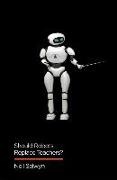Mehr lesen
Developments in AI, robotics and big data are changing the nature of education. Yet the implications of these technologies for the teaching profession are uncertain. While most educators remain convinced of the need for human teachers, outside the profession there is growing anticipation of a technological reinvention of the ways in which teaching and learning take place.
Through an examination of technological developments such as autonomous classroom robots, intelligent tutoring systems, learning analytics and automated decision-making, Neil Selwyn highlights the need for nuanced discussions around the capacity of AI to replicate the social, emotional and cognitive qualities of human teachers. He pushes conversations about AI and education into the realm of values, judgements and politics, ultimately arguing that the integration of any technology into society must be presented as a choice.
Should Robots Replace Teachers? is a must-read for anyone interested in the future of education and work in our increasingly automated times.
Inhaltsverzeichnis
Preface
Acknowledgements
1 AI, Robotics and the Automation of Teaching
2 Physical Robots in the Classroom
3 Intelligent Tutoring and Pedagogical Assistants
4 'Behind-the-Scenes' Technologies
5 Revitalizing Teaching for the AI Age
Notes
Index
Über den Autor / die Autorin
Neil Selwyn is Professor of Education at Monash University, Melbourne.
Zusammenfassung
Developments in AI, robotics and big data are changing the nature of education. Yet the implications of these technologies for the teaching profession are uncertain. While most educators remain convinced of the need for human teachers, outside the profession there is growing anticipation of a technological reinvention of the ways in which teaching and learning take place.
Through an examination of technological developments such as autonomous classroom robots, intelligent tutoring systems, learning analytics and automated decision-making, Neil Selwyn highlights the need for nuanced discussions around the capacity of AI to replicate the social, emotional and cognitive qualities of human teachers. He pushes conversations about AI and education into the realm of values, judgements and politics, ultimately arguing that the integration of any technology into society must be presented as a choice.
Should Robots Replace Teachers? is a must-read for anyone interested in the future of education and work in our increasingly automated times.
Bericht
?Selwyn?s book is a state-of-the-art analysis of the role of technology in education. Persuasive and penetrating, it is the gold standard for discussion of AI and robotics in shaping the classroom of the future.?
Frank Pasquale, University of Maryland
?Selwyn navigates deftly between hype and hysteria to explore the questions we should be asking. The increasingly urgent issues surrounding robots in teaching demand exactly the sort of extensive and careful reflection on display here.?
Charles Ess, University of Oslo
'[A] succinct and useful primer on this evolving and complex area'
Times Education Supplement
'Selwyn presents an entertaining, informative and accessible book which I would thoroughly recommend to everyone be they teacher, student, doctor, nurse, lawyer, psychologist, sociologist, economist, chef, artist, poet and musician.'
Tina Stockman, Media Education Journal

